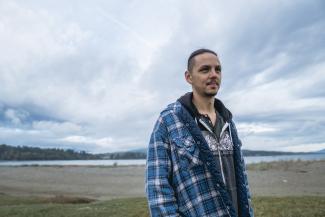
Robert YELḰÁTŦE Clifford is a member of the Tsawout First Nation, one of five communities that make up the WSÁNEĆ on the Vancouver Island. Currently working to complete his PhD dissertation at Osgoode Hall Law School, Professor Clifford is focused on the revitalization of Indigenous legal traditions, specifically as it relates to his own community of W̱SÁNEĆ.
“While my work speaks to the broader revitalization of Indigenous law, it has always been rooted in W̱SÁNEĆ and grounded by the teachings, responsibilities, and care taught to me by my family, as well as associated with the name I carry – YELḰAŦTE,” explained Professor Clifford, whose name was passed on to him by his late grandfather, Dr. Earl Senior YELḰÁTŦE Claxton, a respected elder of the Tsawout First Nation.
“I am interested in understanding W̱SÁNEĆ law and how it functions, on its own terms, as well as theorizing how the revitalization of W̱SÁNEĆ law can happen given the dynamics of colonialism and climate change.”
For his dissertation, Professor Clifford is looking at the integral role that stories and spirituality have played in W̱SÁNEĆ law and the importance of place-based learning in W̱SÁNEĆ legal pedagogy. Through his engagement with the community, Professor Clifford has been looking at two case studies to help inform his thesis.
“The first case study relates to an ongoing court case regarding the history and harms of colonization experienced by an island in W̱SÁNEĆ territory, once a W̱SÁNEĆ village site and burial ground and now (among other things) a privately-owned ‘eco-paradise’ retreat,” explained Professor Clifford.
“I am interested in understanding W̱SÁNEĆ law and how it functions, on its own terms, as well as theorizing how the revitalization of W̱SÁNEĆ law can happen given the dynamics of colonialism and climate change.
“The second case study analyzes the potential to uphold W̱SÁNEĆ legal responsibilities to the marine and terrestrial lands (and all beings who call them home) in and around the southern Gulf Islands through the potential use of two different tools – a National Marine Conservation Area Reserve and associated co-management agreements, and/or an Indigenous Protected and Conserved Area.”
In addition to his dissertation, Professor Clifford is a contributor to the forthcoming book by Paul Bramadat, et al., Indigenous Spirituality in Canada (Toronto: University of Toronto Press).
Professor Clifford joined the Allard School of Law this past summer and will be teaching Indigenous Law and Climate Change and Aboriginal & Treaty Rights to JD students.
“I consider Allard Law to already be a leader in their commitment to Indigenous legal issues, thus attracting a large number of Indigenous law students who will go on to become important future leaders. I am excited to be a part of that environment. I was also excited to hear that Allard is looking to further that commitment with a priority of implementing the Truth and Reconciliation Commission’s Calls to Action regarding an even deeper engagement with Indigenous law, education, and research.”
Professor Clifford adds that UBC’s proximity to his home community of Tsawout was another reason he was keen to join Allard Law. “Given the extent to which my research and methodology is rooted in place and community, this was important to me.”
Learn more about Professor Robert Clifford.


